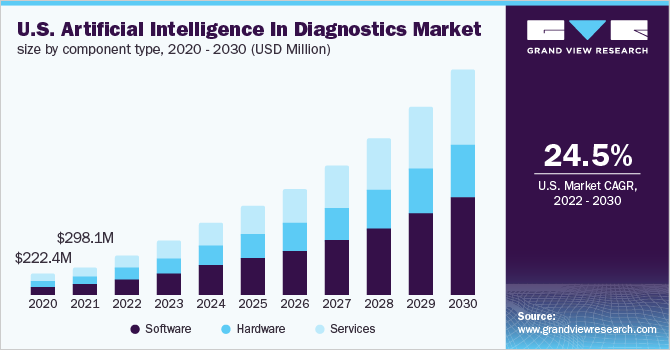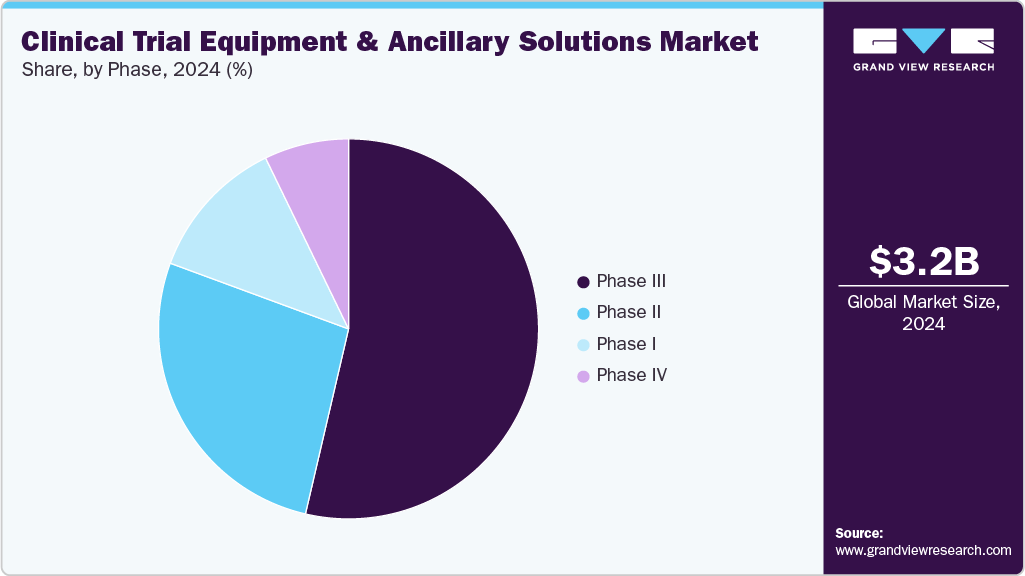Artificial Intelligence in Diagnostics Industry Overview
The artificial intelligence in diagnostics market size was valued at USD 576.3 million in 2021 and is projected to grow at a compound annual growth rate (CAGR) of 26.3% from 2022 to 2030. The healthcare industry is rapidly integrating artificial intelligence (AI)-powered solutions in various verticals to achieve higher operational & clinical outcomes, which is a key contributing factor to the growth. Overburdened healthcare systems struggling with the rapidly rising global prevalence of chronic diseases are driving the demand for automated, innovative processes. Furthermore, the shortage of care providers is contributing to the growing demand for AI-powered systems. For instance, the WHO estimates in 2019 recorded the shortage of care providers to be approximately 4.3 million across the globe.

The ongoing COVID-19 pandemic exposed the shortcomings of the existing healthcare system and accelerated the adoption of digital technologies, such as AI in diagnostics, to accurately analyze complex datasets, thereby, reducing the burden of administrative & operational tasks on clinicians. The emergence of startups and growing recognition in form of funding & investments boosted the market growth. Healthcare startups rapidly began adopting AI-powered systems and receive recognition in the form of favorable government support and funding from private investors & venture capitalists. For instance, in May 2020, Arterys raised an investment of USD 28 million in Series C funding led by Benslie Investment Group and Temasek Holdings to expand its product portfolio.
Gather more insights about the market drivers, restraints, and growth of Global Artificial Intelligence in Diagnostics Market
Similarly, in September 2020, Aidoc received funding of USD 20 million in a Series B round led by Peg Capital. Key players are focusing on devising innovative product development strategies utilizing AI-backed solutions in diagnostics. For instance, in June 2020, GE Healthcare’s Thoracic Care Suite was used in detecting chest anomalies using AI-based diagnostic solutions. In November 2020, Alivecor received U.S. FDA approval for Kardia AI V2 used in advanced ECG diagnostics. The medical diagnostics market is constantly transforming and rapidly adopting innovative, advanced solutions, such as AI-backed algorithms.
Advancements in healthcare IT infrastructure and regular technological developments in cloud storage, computer processing, and machine learning algorithms are supporting the integration of AI-powered systems in diagnostics to provide efficient & accurate diagnosis allowing care providers to devise timely & adequate treatment plans. Pathology and radiology services are witnessing a widespread adoption of AI-based algorithms. For example, AI-powered radiology solutions can collect multiple datasets from imaging modalities and accurately analyze them from the radiologist. Furthermore, several research studies on AI integration in pathology are being conducted and some of the studies are on chronic kidney disease & kidney function tests, and metastatic breast cancer detection.
Moreover, AI-powered diagnostics have played a vital role in detecting & diagnosing the coronavirus strains in patients during the pandemic. The global incidence rate of chronic diseases is rapidly rising and is directly contributing to the surge in demand for early diagnosis and initial treatment management plans, which is positively impacting the development and growth of the market. For instance, as per the WHO estimates in 2018, the global cancer prevalence rate was 18.1 million and is anticipated to reach 22 million by 2034. Most chronic diseases are preventable if detected early, thereby, boosting the adoption rate of AI-based diagnostics, which aids care providers in devising treatment plans to prevent or delay chronic disease. Healthcare professionals can provide a preventive and proactive care approach instead of a reactive approach by using these advanced diagnostic solutions.
Key participants are focusing on innovating solutions to deliver an accurate and rapid diagnosis of chronic diseases. For instance, in February 2018, Verily introduced an AI-powered algorithm, which could be used in detecting cardiovascular diseases through analyzing retinal scans. Key market players are focusing on their product development strategies to expand their portfolios. Furthermore, key participants are devising their collaborations and mergers & acquisition strategies to gain a competitive edge in the market and expand their business. For instance, in April 2020, Lucid Health collaborated with Riverain Technologies to develop AI-based solutions for medical imaging and radiology. In June 2020, Inui Health was acquired by Healthy.io and through this acquisition, Healthy.io plans to deliver advanced home healthcare urinalysis solutions.
Browse through Grand View Research's Healthcare IT Industry Related Reports
AI In Life Science Analytics Market - The global AI in life science analytics market size was valued at USD 1.5 billion in 2022 and is expected to expand at a compound annual growth rate (CAGR) of 11.1% from 2023 to 2030.
AI In Precision Medicine Market - The global artificial intelligence in precision medicine market size was valued at USD 946.0 million in 2021 and is expected to grow at a compound annual growth rate (CAGR) of 35.7% over the forecast period from 2022 to 2030.
Artificial Intelligence in Diagnostics Industry Segmentation
Grand View Research has segmented the global artificial intelligence in diagnostics market report on the basis of component, diagnosis type, and region:
AI In Diagnostics Component Outlook (Revenue, USD Million, 2016 - 2030)
- Software
- Hardware
- Services
AI In Diagnostics Diagnosis Type Outlook (Revenue, USD Million, 2016 - 2030)
- Cardiology
- Oncology
- Pathology
- Radiology
- Chest & Lung
- Neurology
- Others
Artificial Intelligence In Diagnostics Regional Outlook (Revenue, USD Million, 2016 - 2030)
- North America
- Europe
- Asia Pacific
- Latin America
- MEA (Middle East & Africa)
Market Share Insights:
November 2020: Zebra Medical Vision and Storm ID partnered to develop advanced AI-based algorithms to diagnose osteoporosis by analyzing multiple medical image datasets and electronic health information.
Key Companies profiled:
Some prominent players in the global Artificial Intelligence In Diagnostics Industry include
- Aidoc
- AliveCor, Inc.
- Vuno, Inc.
- Digital Diagnostics, Inc.
- Siemens Healthineers
- Neural Analytics
- Riverain Technologies
- Zebra Medical Vision, Inc.
- GE Healthcare
- Imagen Technologies
Order a free sample PDF of the Artificial Intelligence In Diagnostics Market Intelligence Study, published by Grand View Research.


No comments:
Post a Comment